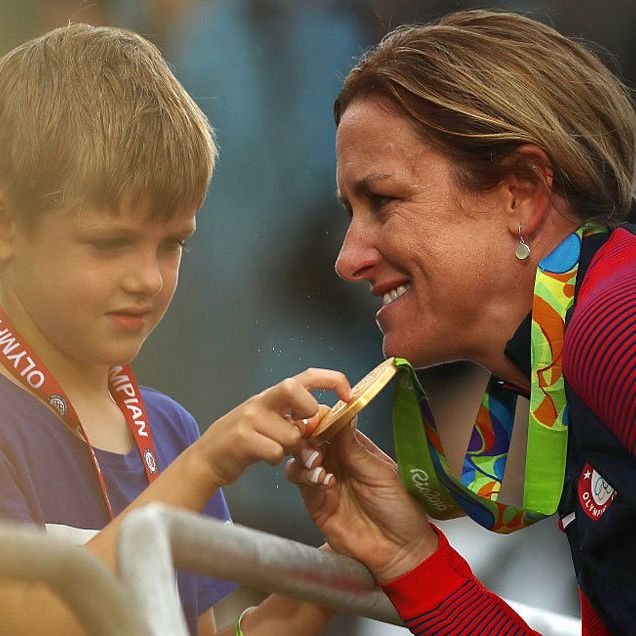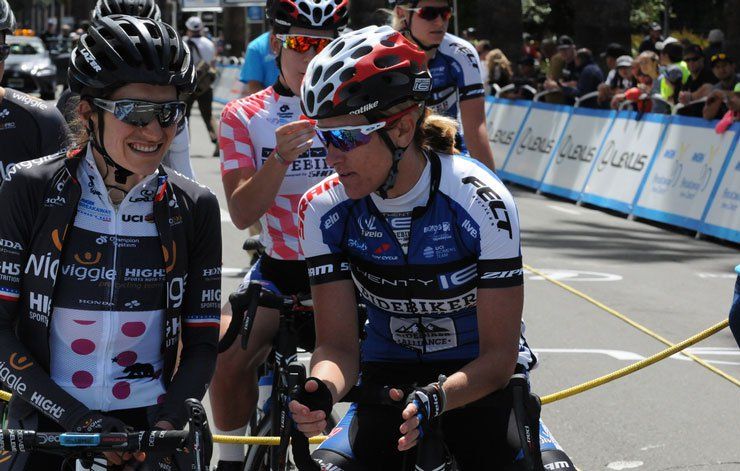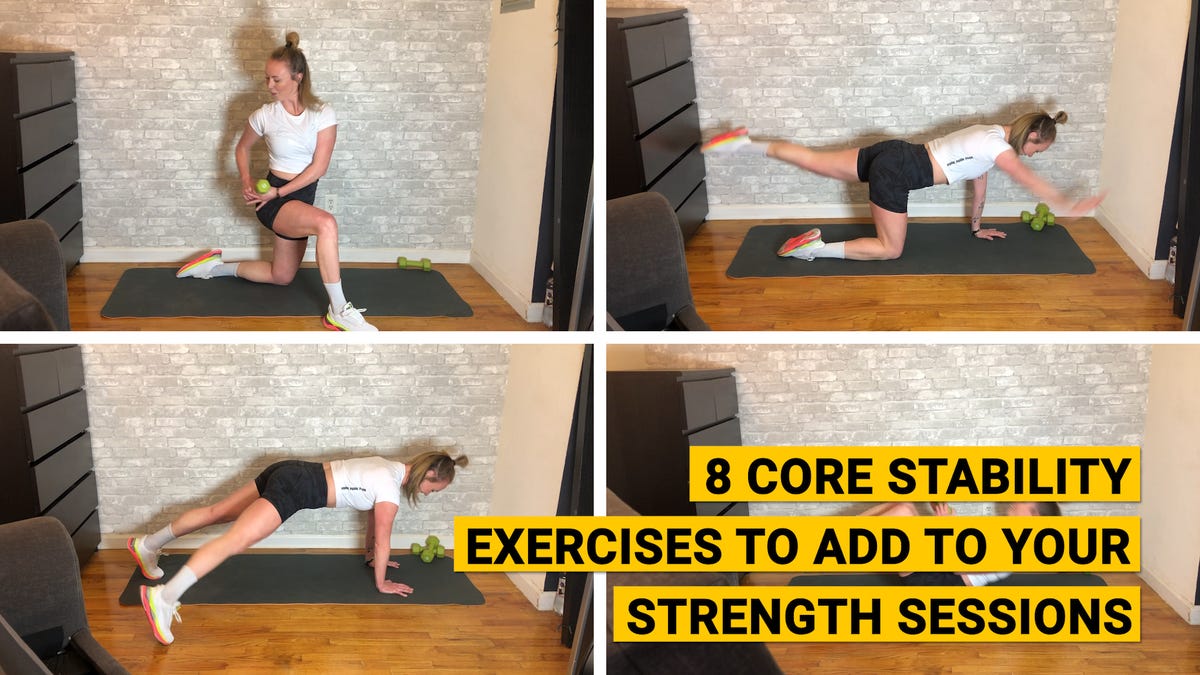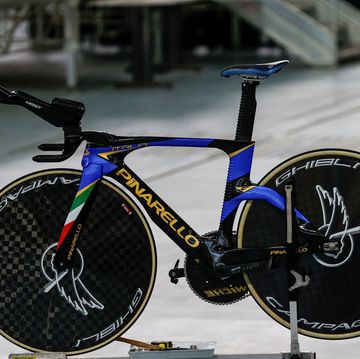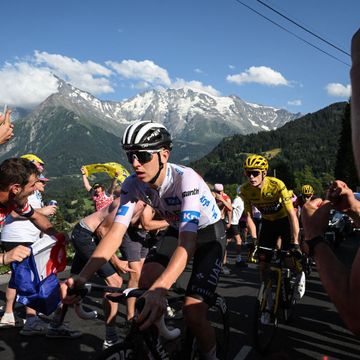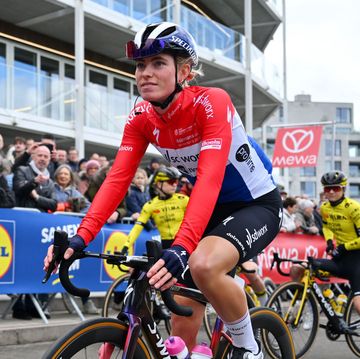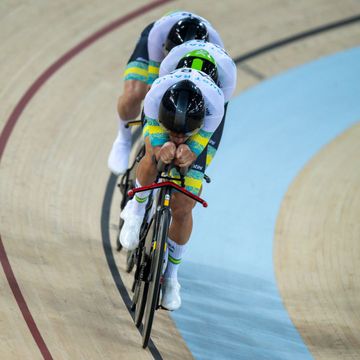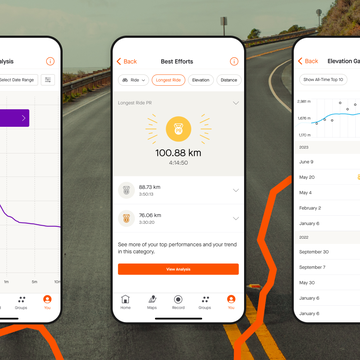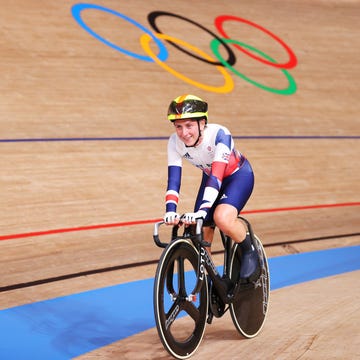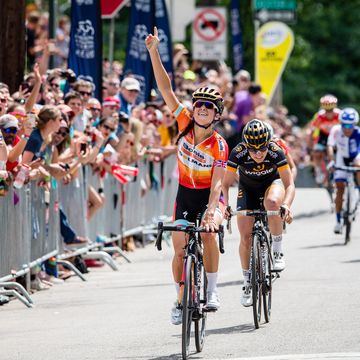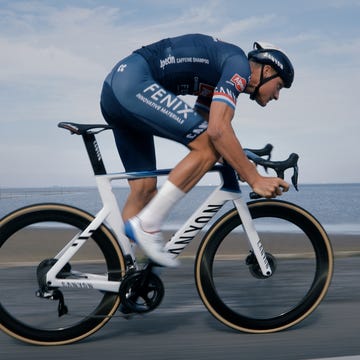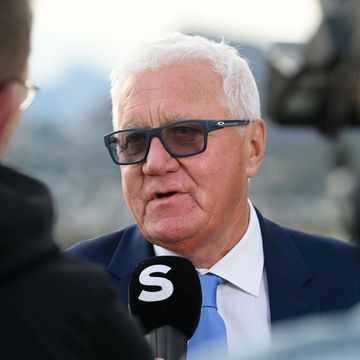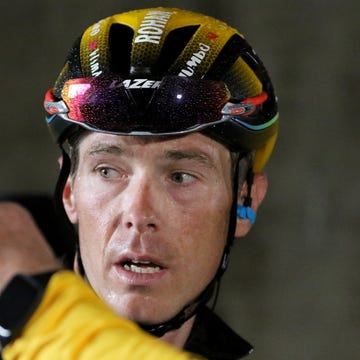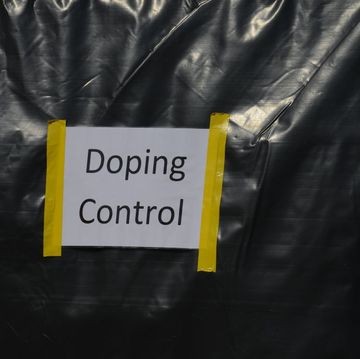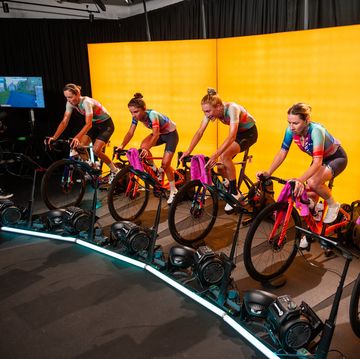Kristin Armstrong is a legend in American cycling, and a rare testament to the work-bike-life balance. This summer in Rio, she won her third Olympic Gold Medal in the Time Trial— becoming the first cyclist of any gender or nationality to win three successive Olympic gold medals in the same event. Bicycling caught up with her a month after the games to talk about victory, family, and the state of women’s racing.
Bicycling: First of all, congratulations. This is literally a historic achievement.
Kristin Armstrong: Thank you.
You’ve had some time now for this to sink in, and I’m curious what it means to you now; if the sensation has changed from immediately after you crossed the line?
You know, it’s interesting, it’s been four weeks now and I still don’t think it’s sunk in… Before you accomplish something so big as a third gold, you can visualize that this is going to be amazing, the ultimate goal. And then when you do it, you think, ‘Did that ever happen?’ It’s easier to use it as motivation going in but afterward, it’s almost unrealistic.
What’s life like for you now? What’s changed?
I’m super busy, sharing my story to lots of people. Here in Idaho, I can’t walk out my door without people waving, honking, stopping me in the grocery store. Every day I’m reminded it’s reality, but it still goes down to it hasn’t changed me as a person. I’m doing things I love to do – I’m getting out on dirt a lot, on the mountain and cross bike and I’m going out and being with kids and schools and talking about how important being healthy is. I’m doing all that work around my passion, but it is pretty unbelievable (laughs). People ask me to explain it and I can’t!
He’d say, ‘Hey mommy, did you win a medal?’ And I’d have to explain to him why I didn’t. Either way it would’ve been a good experience, but he saw me go on the bike every day. It was a big deal to win.
You had already won two golds. What was different about this time?
The road race for me was probably the most fun day I’ve had racing, since, maybe (the 2012 Women’s Tour of) Flanders. That day and the Rio road race, they were so epic and hard and, when you watch the race, I was proud that it was so hard, and it was the best because of Mara (Abbott, who got fourth). That touched me. It was very difficult (for her) to end with that result. But for the general population watching, maybe the first time ever, it was great. I’ve heard from more people that they have a new respect for our sport… Rio was how and why I race my bike.
RELATED: Leslie Jones Tweets Perfectly Capture What it's Like to be a Women's Cycling Fan
One of the criticisms I heard during the Olympic selection process and arbitration was that you’d be so focused on the time trial you wouldn’t work in the road race. But watching the road race, you did a ton of work to bring back breaks and put Mara (Abbott) in position for her attack. How did you balance your commitments for both races?
People commented: ‘You did the work of five riders in the road race, and I don’t know what you’ll have for Wednesday (the TT).’ I think the reason was it was a little bit of protection. If I had a bad race on Wednesday, I gave everything for the team…If I gave 50 percent in the road race and then got eighth in the TT, then that wasn’t worth it. I was scared. But then I was nervous after the road race because I raced so hard.
It’s not normal for peers to want and give so much, especially after coming so close themselves. It’s not spite, it’s that we’re all competitors and we all want to win. But for her to be so supportive and so genuinely excited for me, that was— I couldn’t have asked for any more, not even from my best friends. I would do anything for her.
Right, you had two days before the TT; how did you recover?
So afterward, I e-mailed (exercise physiologist and former Osmo co-founder) Stacy Sims. I love her and she has so much knowledge. I said, ‘I have 48 hours to feel better; you need to help me. What do I do?’ And she said I needed to eat 20-30 grams of protein every two hours and use my Normatec (compression recovery system) and take ice baths. So starting Monday (the day after the road race), I had 20-30g protein every 2 hours. I’d do my Normatec for 30-45 minutes and take a cold bath and then I’d eat, and wait a couple of hours and do it all again. I’d be at the recovery center first thing in the morning and be there until 10 at night. The staff was great, but I was really self-conscious about it. Like, ‘Who is this old person and why is she so needy?’
RELATED: How to Recover From Hard Rides
You’ve mentioned the people who stick with you in hard times, and that they’re not always who you expect. It seems like Mara was one of those, which was remarkable considering she was just coming off this ride that saw her lose an Olympic medal in the final 150 meters. What’s your relationship like with her; how close were you before Rio?
I was a director on the Peanut Butter and Twenty12 team she was on in 2012. (laughs) We should never date, but we respected each other as athletes…Rio took it to another level. Here’s a girl who had an event she’ll think about the rest of her life, and she’s been replaying it in her mind, I’m sure, I don’t know how many times, and told herself she gave everything she had. But within 24 hours of that, she is writing me notes, like, ‘I believe in you,’ and one says ‘champion’ and all these notes—I’d find them on my hairbrush or pillow or helmet. And she turned this disappointment she experienced completely around, and poured all her energy into helping me have a successful day. I’ve been around a long time in this sport and that’s not normal. It’s not normal for peers to want and give so much, especially after coming so close themselves. It’s not spite, it’s that we’re all competitors and we all want to win. But for her to be so supportive and so genuinely excited for me, that was—I couldn’t have asked for any more, not even from my best friends. I would do anything for her.
When you won gold in London, your son, Lucas, was only two. This time around, he’s old enough to start to understand what this is all about. What did that mean for you to be able to share this with him?
He did start figuring out what mommy does. He’d seen pictures of the (Rio) medal and knew about the (Beijing and London) medals, and he’s done running events and gotten them himself. So I knew he got it. But you think about it, and then it’s, ‘What if I don’t bring home the medal?’ He’d say, ‘Hey mommy, did you win a medal?’ And I’d have to explain to him why I didn’t. Either way it would’ve been a good experience, but he saw me go on the bike every day. It was a big deal to win.
RELATED: 5 Books About Cycling That Every Kid Should Read
Young kids require so much time and attention as they get older, and you were also working part-time while training. There’s that myth, that you can be superwoman and be a mom and work part time and train enough to win a gold medal. But there are only so many hours in a day; something had to be sacrificed there. What was it?
What was lost? Ask my friends if they saw me the last 18 months. I enjoy going to friends’ houses for dinner and catching up over coffee or easy rides. That didn’t exist. My mornings, I’d wake up and I want that first hour to myself—I respond to e-mail and have my coffee, and then Lucas would wake up and I’d get him ready and drop him off at pre-school. Depending on work, I’d block my calendar for the first or second part of the day for meetings and work for several hours. If it was winter I’d work in the morning and ride in the afternoon, and I would switch in summer. (My husband) Joe had a lot of flexibility, so if I had an easier ride I’d pick up Lucas from pre-school, and if I had a longer one he would. He was able to support that. The one thing Joe and I both believe is that, when Lucas got home, we’d spend afternoons through bedtime as family. That’s special time, no screens.
RELATED: Best Workouts for 9-to-5 Life
That gets us into a topic I wanted to discuss: there’s so much difference in the level of support for elite women racers compared to men. Women have to create their own support networks, and obviously your family is a big part of yours. How did you put together what you needed?
I learned a while ago that as a female cyclist if you want to get something done you have to do it yourself. Your team provides for you for sure. I have wonderful sponsors on team Twenty16 and Nicola (Cranmer, general manager) does a great job. We get great equipment, support at races, all that. But things like coaching and what I’d call performance support, things like going to the wind tunnel, nutrition advice, those are things that men’s team have as part of staff… Women’s teams, it’s not. So that support team became critical to me accomplishing what I have in my career. Not only is there a big discrepancy in support between men and women, but there’s a big one even within women’s racing, with your competitors on the line. At a world-class level, everyone trains hard. If you don’t have that support you’re already at a disadvantage.
Women’s cycling will grow, but tomorrow we won’t all of a sudden have $20 million budgets.
Are there any opportunities in women’s racing like the Olympics? The men’s calendar has the Tour and a few other high-profile events, but the women’s calendar really doesn’t seem to at the same level.
For women, because our sport is not lucrative and is not based on big money contracts, the Olympics are by far the biggest event, especially if you medal. For all the years I’ve been in the sport, to me it’s the only event I’d consider life-changing. It’s not that I won’t have to work the rest of my life or something, but there are more opportunities to become maybe what you will be, to help define your legacy. I’ve embraced public speaking, for example.
There’s not much money in regular races either; is that changing?
I know the race directors try their best. I’ve always said I’d rather have a race with no prize purse than no race at all. But I don’t even look at the race bible to see (if there’s) prize money. In all my years of racing, once you’ve split it between the team, I’ve never had a prize that was enough for more than a tank of gas. But today, you’ll see some of the best women’s racers in America are on pure criterium teams – that’s where the money is.
RELATED: 15 Women's Cycling Groups We Love
There has been an increase in interest in women’s racing the past few years. Is that sustainable? The men’s side struggles even today with people like Oleg Tinkov, sugar daddies who come in with a bunch of money but then lose interest. What’s the right model for women’s racing?
The most difficult thing is that any large company that wants to put in an investment, without (video) broadcast there’s not much return on investment. And so what it takes is sponsors for whom it has nothing do with return on investment; it has to do with passion for bikes… In terms of the budget for adding a women’s team to a men’s, the shared resources would be amazing… The one time in my career where that was the case was the Cervelo Test Team…We went to the same camps, we had the same equipment and support. I love that model. Mike Tamayo used to direct Victory Brewing, and that team’s budget was like $30,000. And now he runs Unitedhealthcare’s team with a multi-million budget and there’s a women’s team under that umbrella. Women’s cycling will grow, but tomorrow we won’t all of a sudden have $20 million budgets.
You’re going to stay in the sport as a mentor, but you’re no longer racing, so you’re moving past a lot of this personally. What is next for you? It seems like you’re staying pretty busy.
Yeah, I am. I made a promise to myself after London; I wanted normalcy. I wanted to be back in Boise and have a normal life because I missed it. I thought I missed it. Now I made a promise that, ‘If things go well in Rio I am going to continue to live a little bit of a chaotic life for 12 to 18 months, and take every opportunity that comes my way.’ Last time around, I said, ‘I can’t be bothered. I’m so tired, I want a normal life.’ This time around. I’m booking for speaking engagements, and I’m booked through next May; every month I have something. After London was really stressful because I had mom guilt: you have a two-year-old and you want to be normal. But part of the journey and being successful—and this is the fun part—is that you get to share your story and meet with all kinds of interesting people and companies. I am going to ride this for a while and have fun with it and embrace it.
Joe Lindsey is a longtime freelance journalist who writes about sports and outdoors, health and fitness, and science and tech, especially where the three elements in that Venn diagram overlap.
